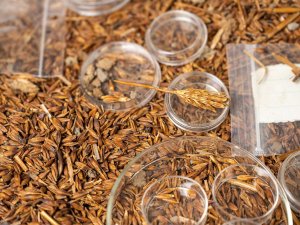Presented By: Kelsey Museum of Archaeology
Digging Deeper and FAST Lecture | Reassessing Agriculture, Diet, and (Mal)Nutrition at Greco-Roman Karanis: New Insights from the AGROS Project
Frits Heinrich

This lecture provides an overview of some of the recent results from diverse chemical analyses on the Karanis archaeobotanical collection at the Kelsey Museum of Archaeology in the context of the AGROS project— “Agriculture, Diet and Nutrition in Greco-Roman Egypt. Reassessing Ancient Sustenance, Food Processing and (Mal)Nutrition”—funded by the Belgian Excellence of Science program.
The lecture aims to illustrate the value and potential of these chemical approaches by focusing on three brief case studies from the AGROS project. The first shows how plant stable isotope analysis can help us model agricultural practices (such as manuring and irrigation) and reconstruct environmental conditions at Karanis. The second case study provides insights into what we can learn from the differences between the (anti)nutritional properties of modern and ancient crops following analyses of the Karanis collection. Lastly, the third case study focuses on the project’s interdisciplinary efforts to recreate and nutritionally assess ancient recipes, food processing practices, and foodstuffs. Throughout the presentation, we will also consider the potential for the modern application of the project’s results.
Frits Heinrich is assistant professor of ancient, agricultural, and food history at the research groups Interdisciplinary Historical Food Studies (FOST) and Industrial Microbiology and Food Biotechnology (IMDO) at the Vrije Universiteit Brussels (VUB). He is also the assistant director and creator of the AGROS project.
“Reassessing Agriculture, Diet, and (Mal)Nutrition at Greco-Roman Karanis” is co-sponsored by the Kelsey Museum’s Digging Deeper: Thursday Night Lecture Series and FAST (Field Archaeology Series on Thursday) program. Please join us in the Kelsey Museum’s Newberry Hall classrooms. Light refreshments will be provided before the lecture, which will begin at 6 PM.
This event is free and open to all visitors. If you have any questions or concerns regarding accessing this event, please visit our accessibility page at https://myumi.ch/zwPkd or contact the education office by calling (734) 647-4167. We ask for advance notice as some accommodations may require more time for the university to arrange.
The lecture aims to illustrate the value and potential of these chemical approaches by focusing on three brief case studies from the AGROS project. The first shows how plant stable isotope analysis can help us model agricultural practices (such as manuring and irrigation) and reconstruct environmental conditions at Karanis. The second case study provides insights into what we can learn from the differences between the (anti)nutritional properties of modern and ancient crops following analyses of the Karanis collection. Lastly, the third case study focuses on the project’s interdisciplinary efforts to recreate and nutritionally assess ancient recipes, food processing practices, and foodstuffs. Throughout the presentation, we will also consider the potential for the modern application of the project’s results.
Frits Heinrich is assistant professor of ancient, agricultural, and food history at the research groups Interdisciplinary Historical Food Studies (FOST) and Industrial Microbiology and Food Biotechnology (IMDO) at the Vrije Universiteit Brussels (VUB). He is also the assistant director and creator of the AGROS project.
“Reassessing Agriculture, Diet, and (Mal)Nutrition at Greco-Roman Karanis” is co-sponsored by the Kelsey Museum’s Digging Deeper: Thursday Night Lecture Series and FAST (Field Archaeology Series on Thursday) program. Please join us in the Kelsey Museum’s Newberry Hall classrooms. Light refreshments will be provided before the lecture, which will begin at 6 PM.
This event is free and open to all visitors. If you have any questions or concerns regarding accessing this event, please visit our accessibility page at https://myumi.ch/zwPkd or contact the education office by calling (734) 647-4167. We ask for advance notice as some accommodations may require more time for the university to arrange.